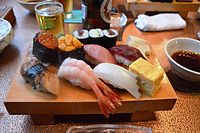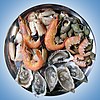ペスカタリアニズム
この記事は英語版の対応するページを翻訳することにより充実させることができます。(2020年1月) 翻訳前に重要な指示を読むには右にある[表示]をクリックしてください。
|
| ペスカタリアニズム | |
|---|---|
   | |
| 説明 | |
| 菜食に加えて魚介類以外の肉類を食さない食生活[1] | |
| 関連項目 | |
| 類似した食生活 | |
ペスカタリアニズム(pescatarianism、[ˌpɛskəˈtɛəriənɪzəm])またはペスクタリアニズム(pescetarianism)は、菜食主義に魚介類を加えた食事法である[2][3]。
ペスカタリアンという用語は、1884年にベジタリアン協会と同様の食事の原則を実践している人々として初めて説明された[4]。 21世紀においては、ベジタリアン協会は、ペスカタリアニズムを完全な菜食主義とは認めず、準菜食主義に分類している[5]。
魚介類の痛覚
[編集]
動物に苦痛を与えないという立場からベジタリアニズムを実践する場合、魚介類が苦痛を感じているかどうかが重要な焦点となる。 科学的な見地から見ると、魚類の脳には動物に痛みを感じさせる機能領域が存在する。さらに、魚類には人間と同様の侵害受容器があり、この受容器から痛みの信号が脳に伝達されることで、魚類も痛みを感じることが実証されている[6]。
また、タコやイカなどの頭足類とエビやカニなどの十脚甲殻類は、苦痛の感覚性があると科学的に証明されている [7]。
一方、貝類では、痛みを感じるか否かを、完全には証明できていない[8]。
-
新鮮な植物性食品、農産物は、ペスカタリアンの食事の大半を占める。
-
魚介類はペスカタリアン食に含まれる。
動機
[編集]動物福祉、動物愛護
[編集]魚介類は哺乳類や他の四肢動物のような動物とは異なり、恐怖、痛み、苦しみを表出しないため、ぺスカタリアン主義を倫理的な選択であるとする場合がある [9] [10] [11]。実際には、科学的な観点では、魚の脳には痛みを感じさせる機能領域が存在する。 そして、魚類には人間と同様の痛覚受容体があり、そこから脳に痛覚信号が送られ、魚類が痛みを感じるという研究結果がある[12]。賛否両論がある[13] [14]。
ぺスカタリアンの中には、菜食主義への移行期間とする人もいる。一方で[15]、植物からは摂取できない栄養素を摂取するために、倫理的な妥協点として魚介類を食べている人もいる[16]。
持続可能性と環境保護
[編集]ぺスカタリアンなどの動物性食品を控える人は「緑の政治」に参加し、食糧の持続可能性と環境保護に配慮する傾向がある[17] [18]。食生活を通じてCO2排出量を減らしたいという動機の場合もある[19] [20]。
2017年の国連食糧農業機関(FAO)の報告によると、世界の温室効果ガス(GHG)の総排出量のうち、畜産分野は14.5%を占めている[21]。
2014年の温室効果ガス排出量の分析で、ぺスカタリアン食の食生活は雑食の食生活に比べて排出量が45%削減されることが推定された[22] [23]。イギリス居住者の調査で、肉食者の食事による温室効果ガス排出量はぺスカタリアン食よりも約50%高いことが判明した [24]。 温室効果ガス排出量、土地利用、エネルギー需要を評価した場合、雑食の食事と比較して、ぺスカタリアンの食事は環境への影響が64%少ない[25]。
2018年の日本の研究で、ぺスカタリアン食によって日本人の食事窒素フットプリントを削減できることが分かった[26]。 魚介類は、赤身の肉や鶏肉に比べて、一次、小売、消費者レベルでの食品廃棄が著しく少ないため、食品ロスを削減できる[27]。さらに、節水も動機となる。多国籍研究で、従来の食事をぺスカタリアン食にすると、水フットプリントを33%から55%削減できることが分かった[28]。
健康
[編集]ぺスカタリアン主義を採用する理由は、健康に関連したものがある。ぺスカタリアン食や地中海食は、心血管疾患のリスクが低下する[29] [30]。 ぺスカタリアン食は糖尿病[31] 、体重増加[32] 、全死亡率[33]への影響についての研究が行われている。一方で、水銀やポリ塩化ビフェニル(PCB)などの毒素を含む魚の摂取よる健康リスクの懸念はある[34]が、水銀を含む魚の摂取を控えることはできる[35] 。
宗教、人道
[編集]2018年の世界的な調査によると、ぺスカタリアン、菜食主義者などの大多数(87%)は、食品の選択は倫理的懸念、環境への影響、社会的責任などに影響されていると報告している[36]。また、宗教的または人道的な理由などの倫理的な懸念によって動機付けられる場合がある。 食糧不安の人間が消費するタンパク質源は、濾過摂食動物や野生の魚では無駄にならない。
脚注
[編集]- ^ Definition of Pescatarian by Merriam-Webster, メリアム=ウェブスター
- ^ Luna, Taryn (2015年7月1日). “Legal Sea Foods launches 'Pescatarianism' ad campaign”. ボストン・グローブ
- ^ 『ペスカタリアン』 - コトバンク(デジタル大辞泉)
- ^ “International Health Exhibition”. The Medical Times and Gazette (1884年5月24日). 2019年5月18日閲覧。 “There are two kinds of Vegetarians—one an extreme form, the members of which eat no animal food whatever; and a less extreme sect, who do not object to eggs, milk, or fish. The Vegetarian Society ... belongs to the latter more moderate division”
- ^ “Fish”. The Vegetarian Society of the United Kingdom Limited. 2020年2月1日閲覧。
- ^ “Fish have feelings too: Why animal sentience means we should rethink food”. euronews.green. (2023年6月25日)
- ^ “タコやエビにも苦痛の感覚、動物福祉法案の保護対象に 英”. CNN.co.jp (朝日インタラクティブ). (2021年11月23日)
- ^ “ホタテはヴィーガンなのか?”. vice (vice media group). (2019年6月26日)
- ^ “Do fish feel pain? Not as humans do, study suggests”. ScienceDaily (8 August 2013). 8 November 2017時点のオリジナルよりアーカイブ。18 January 2018閲覧。
- ^ Rose, J D; Arlinghaus, R; Cooke, S J; Diggles, B K; Sawynok, W; Stevens, E D; Wynne, C D L (March 2014). “Can fish really feel pain?”. Fish and Fisheries 15 (1): 97–133. Bibcode: 2014AqFF...15...97R. doi:10.1111/faf.12010 29 October 2020閲覧。.
- ^ Key, Brian (March 2015). “Fish do not feel pain and its implications for understanding phenomenal consciousness”. Biology and Philosophy 30 (2): 149–165. doi:10.1007/s10539-014-9469-4. PMC 4356734. PMID 25798021.
- ^ “Fish have feelings too: Why animal sentience means we should rethink food”. euronews.green. (25 June 2023) 7 May 2024閲覧。
- ^ “It's Official: Fish Feel Pain” (英語). Smithsonian Magazine. 25 May 2021時点のオリジナルよりアーカイブ。28 May 2021閲覧。
- ^ “Scientists say fish feel pain. It could lead to major changes in the fishing industry.” (英語). The Washington Post. ISSN 0190-8286. オリジナルの15 October 2021時点におけるアーカイブ。 28 May 2021閲覧。
- ^ Ronald L. Sandler, Food Ethics: The Basics, Routledge, 2014, p. 74.
- ^ Rohrer, Finlo (5 November 2009). “The rise of the non-veggie vegetarian”. BBC News. オリジナルの7 November 2009時点におけるアーカイブ。 22 July 2013閲覧。
- ^ Hoehn, Daniel; Margallo, María; Laso, Jara; García-Herrero, Isabel; Bala, Alba; Fullana-i-Palmer, Pere; Irabien, Angel; Aldaco, Rubén (January 2019). “Energy Embedded in Food Loss Management and in the Production of Uneaten Food: Seeking a Sustainable Pathway” (英語). Energies 12 (4): 767. doi:10.3390/en12040767. hdl:10902/15909.
- ^ Tilman, David; Clark, Michael (November 2014). “Global diets link environmental sustainability and human health” (英語). Nature 515 (7528): 518–522. Bibcode: 2014Natur.515..518T. doi:10.1038/nature13959. ISSN 1476-4687. PMID 25383533 6 February 2021閲覧。.
- ^ “Carbon footprint factsheet”. Center for Sustainable Systems, University of Michigan (2018年). 19 June 2020時点のオリジナルよりアーカイブ。19 May 2019閲覧。
- ^ Scarborough, P.; Appleby, P. N.; Mizdrak, A.; Briggs, A. D.; Travis, R. C.; Bradbury, K. E.; Key, T. J. (11 June 2014). “Dietary greenhouse gas emissions of meat-eaters, fish-eaters, vegetarians and vegans in the UK”. Climatic Change (Springer) 125 (2): 179–192. Bibcode: 2014ClCh..125..179S. doi:10.1007/s10584-014-1169-1. PMC 4372775. PMID 25834298.
- ^ “畜産由来の温暖化ガスとは 全排出の14.5%占める”. 日本経済新聞. (2024年5月12日)
- ^ Magkos, Faidon; Tetens, Inge; Bügel, Susanne Gjedsted; Felby, Claus; Schacht, Simon Rønnow; Hill, James O; Ravussin, Eric; Astrup, Arne (1 January 2020). “A Perspective on the Transition to Plant-Based Diets: a Diet Change May Attenuate Climate Change, but Can It Also Attenuate Obesity and Chronic Disease Risk?”. Advances in Nutrition 11 (1): 1–9. doi:10.1093/advances/nmz090. ISSN 2161-8313. PMC 7442415. PMID 31504086.
- ^ Tilman, David; Clark, Michael (1 November 2014). “Global diets link environmental sustainability and human health” (英語). Nature 515 (7528): 518–522. Bibcode: 2014Natur.515..518T. doi:10.1038/nature13959. ISSN 1476-4687. PMID 25383533 6 February 2021閲覧。.
- ^ Scarborough, Peter; Appleby, Paul N.; Mizdrak, Anja; Briggs, Adam D. M.; Travis, Ruth C.; Bradbury, Kathryn E.; Key, Timothy J. (1 July 2014). “Dietary greenhouse gas emissions of meat-eaters, fish-eaters, vegetarians and vegans in the UK” (英語). Climatic Change 125 (2): 179–192. Bibcode: 2014ClCh..125..179S. doi:10.1007/s10584-014-1169-1. ISSN 1573-1480. PMC 4372775. PMID 25834298.
- ^ Rabès, Anaëlle; Seconda, L.; Langevin, B.; Allès, B.; Touvier, M.; Hercberg, S.; Lairon, D.; Baudry, J. et al. (2020). “Greenhouse gas emissions, energy demand and land use associated with omnivorous, pesco-vegetarian, vegetarian, and vegan diets accounting for farming practices”. Sustainable Production and Consumption 22: 138–146. doi:10.1016/j.spc.2020.02.010.
- ^ Oita, Azusa; Nagano, Ichiro; Matsuda, Hiroyuki (1 April 2018). “Food nitrogen footprint reductions related to a balanced Japanese diet”. Ambio 47 (3): 318–326. Bibcode: 2018Ambio..47..318O. doi:10.1007/s13280-017-0944-4. ISSN 0044-7447. PMC 5857260. PMID 28913773.
- ^ “Beef Research - Food Waste” (英語). Beef Research. 25 March 2022閲覧。
- ^ “Change your diet to save both water and your health” (英語). ScienceDaily 23 March 2021閲覧。.
- ^ O’Keefe, James H.; Torres-Acosta, Noel; O’Keefe, Evan L.; Saeed, Ibrahim M.; Lavie, Carl J.; Smith, Sarah E.; Ros, Emilio (22 September 2020). “A Pesco-Mediterranean diet with intermittent fasting”. Journal of the American College of Cardiology 76 (12): 1484–1493. doi:10.1016/j.jacc.2020.07.049. ISSN 0735-1097. PMID 32943166.
- ^ Estruch, Ramon; Sacanella, Emilio; Ros, Emilio (4 January 2021). “Should we all go pesco-vegetarian?”. European Heart Journal 42 (12): 1144–1146. doi:10.1093/eurheartj/ehaa1088. ISSN 0195-668X. PMID 33393612.
- ^ Papier, Keren; Appleby, Paul N.; Fensom, Georgina K.; Knuppel, Anika; Perez-Cornago, Aurora; Schmidt, Julie A.; Tong, Tammy Y. N.; Key, Timothy J. (25 February 2019). “Vegetarian diets and risk of hospitalisation or death with diabetes in British adults: results from the EPIC-Oxford study” (英語). Nutrition and Diabetes 9 (1): 7. doi:10.1038/s41387-019-0074-0. ISSN 2044-4052. PMC 6389979. PMID 30804320.
- ^ Knüppel, A.; Appleby, P. N.; Key, T. J. (7 March 2019). “Weight change over 14 years in meat-eaters, pescatarians, vegetarians and vegans” (英語). Proceedings of the Nutrition Society 78 (OCE1). doi:10.1017/S0029665119000417. ISSN 0029-6651.
- ^ Schwingshackl, Lukas; Schwedhelm, Carolina; Hoffmann, Georg; Lampousi, Anna-Maria; Knüppel, Sven; Iqbal, Khalid; Bechthold, Angela; Schlesinger, Sabrina et al. (26 April 2017). “Food groups and risk of all-cause mortality: a systematic review and meta-analysis of prospective studies”. American Journal of Clinical Nutrition 105 (6): 1462–1473. doi:10.3945/ajcn.117.153148. ISSN 0002-9165. PMID 28446499 19 May 2019閲覧。.
- ^ Committee on the Toxicological Effects of Methylmercury, Board on Environmental Studies and Toxicology, National Research Council, Council, National Research; Studies, Division on Earth Life; Sciences, Commission on Life; Toxicology, Board on Environmental Studies and; Methylmercury, Committee on the Toxicological Effects of (2000). Toxicological Effects of Methylmercury. National Academies Press. ISBN 978-0-309-07140-6. オリジナルの6 February 2012時点におけるアーカイブ。 12 May 2007閲覧。
- ^ “Experts Say Consumers Can Eat Around Toxins In Fish”. ScienceDaily. 30 April 2019時点のオリジナルよりアーカイブ。7 January 2015閲覧。
- ^ “Survey: Most meat eaters are influenced by ethical concerns” (英語). Verdict Food Service (30 July 2019). 29 April 2022閲覧。




